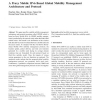Free Online Productivity Tools
i2Speak
i2Symbol
i2OCR
iTex2Img
iWeb2Print
iWeb2Shot
i2Type
iPdf2Split
iPdf2Merge
i2Bopomofo
i2Arabic
i2Style
i2Image
i2PDF
iLatex2Rtf
Sci2ools
105
click to vote
MONET
2010
2010
A Proxy Mobile IPv6 Based Global Mobility Management Architecture and Protocol
This paper specifies a global mobility management architecture and protocol procedure called GPMIP, which is based on Proxy Mobile IPv6. In GPMIP, mobility management is performed by the network entity rather than individual mobile nodes. The benefit is the elimination of the wireless link data delivery tunnel overhead between a mobile node and the access router. To compare with the well known Hierarchical Mobile IPv6 mobility management protocol, the location update, packet delivery, and total cost functions generated by a mobile node during its average domain residence time are formulated for each protocol based on fluid flow mobility model. Then, the impacts of various system parameters on the cost functions are analyzed. The analytical results indicate that the proposed global mobility management protocol can guarantee lower total costs. Furthermore, a qualitative comparison between GPMIP and some other global management protocols is also investigated. Keywords global mobility mana...
Related Content
| Added | 29 Jan 2011 |
| Updated | 29 Jan 2011 |
| Type | Journal |
| Year | 2010 |
| Where | MONET |
| Authors | Huachun Zhou, Hongke Zhang, Yajuan Qin, Hwang-Cheng Wang, Han-Chieh Chao |
Comments (0)

